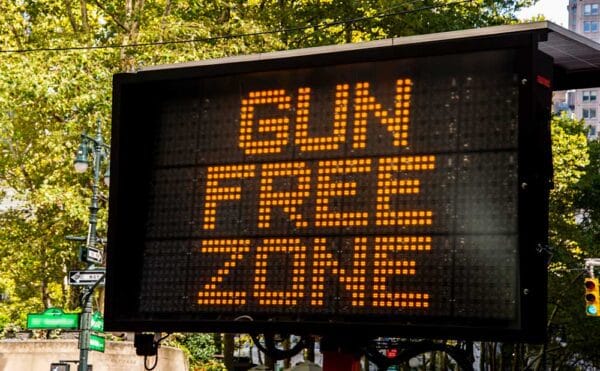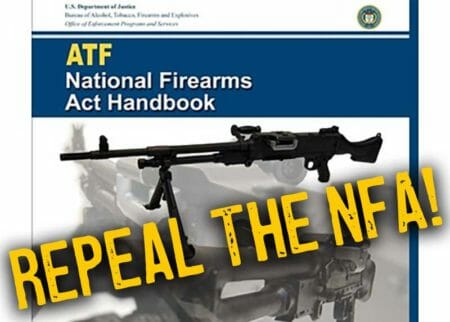
The challenge to the Gun Free School Zone (GFSZ) case from Billings, Montana, involving Gabriel Metcalf, has an interesting twist. The judges in the case asked the attorneys on both sides to present briefs addressing the impact on the case from Rehaif v. United States, 2019. Rehaif established a precedent that, in order to be found guilty, the defendant had to know he belonged to a category that was barred from possessing a firearm, as that was one of the elements of the crime.
As mentioned in previous articles, local officials repeatedly told Gabriel Metcalf he was not violating the law. He believed the GFSZ statute was unconstitutional. The day before Gabriel was arrested, Billings Police Department Lt. Matt Lennick indicated the local police did not have any authority to arrest Gabriel, so they had contacted federal authorities to see what they could do. From the bozemandailychronicle.com:
While the man was not breaking any state laws in doing so, Lennick said, BPD increased their patrols in the area surrounding the school. Police also contacted federal agencies for assistance with the situation.
The briefs on the applicability of Rehaif were filed with the Court on June 30, 2025. The Federal Defender argues it is only simple justice for the appellate court to consider that Gabriel Metcalf believed he was not breaking the law. The issue of local officials telling him he was not breaking the law was not allowed at trial by the presiding judge.
From the defense brief for the Appellant:
The law in 2023 told Metcalf his right to act as he did was enshrined in the United States Constitution and statutorily protected by the law of his eventual conviction. Given the District Court’s Order concerning Montana’s §922(q)(B)(ii)-specific licensing law, Gabriel Metcalf has been convicted of violating the Act under circumstances from which no citizen could have ascertained his conduct to be unlawful. This is an error, it is clear from review of the record (ER_21-59), it affected Metcalf’s substantial rights, and such a conviction will negatively impact the fairness of his judicial proceedings in violation of the Rehaif principle by sustaining a conviction obtained where absence of criminal intent is a matter of law.
(snip)
This was evident on March 25, 2024, when Metcalf and the United States met at the District Court for his trial. During the pretrial conference, the United States addressed its motion in limine that sought to prevent a “defense of entrapment by estoppel” by asking “state witnesses whether they told the defendant he was in violation of state law or not, or the fact he was not in violation of state law”. ER_22. The defense argued that fact and those statements were relevant to Metcalf’s mental state concerning whether he knew “or had reasonable cause to believe” he was in a federal school zone. ER_23. The United States responded that it was not required to prove Metcalf knew his actions were unlawful under federal law. Id. The Court granted the Government’s motion. Id.
(snip)
“A plain error that affects substantial rights may be considered even though it was not brought to the court’s attention.” Rule 52(b), F.R.Crim.P. The record shows “(1) there was an error, (2) the error is clear or obvious, (3) the error affected [Metcalf’s] substantial rights, and (4) the error seriously affected the fairness, integrity, or public reputation of judicial proceedings”.
When Gabriel accepted the plea deal from the prosecution, part of the deal was that he could appeal only the decision on the motion to dismiss the case made by the trial Judge. The motion involved two issues: whether Gabriel was exempted from the GFSZ act by Montana law, and whether the GFSZ act was unconstitutional. The Rehaif case was not mentioned. The Appellee, the USA, argues the Appeals court should not use any information or issues outside of what was agreed to in the plea deal.
From the brief for the Appellee, USA, by the Federal Attorney for Montana:
It is not disputed that Gabriel Metcalf had the mental state required to meet the material elements of 18 U.S.C. § 922(q)(2)(A): he knew he possessed a firearm in a place he knew or had reasonable cause to believe was a school zone.1 Metcalf agreed with the United States with respect to the elements of the offense in the plea agreement and the plea colloquy and, indeed, offered the same elements in his proposed jury instructions. And, in exchange for a benefit from the government, Metcalf waived his right to appeal any argument that his conduct did not fall within the statute of conviction.
Appeals courts seldom go beyond what they are presented with, but they can make exceptions in exceptional cases. The three-judge panel is considering whether Rehaif is relevant. Using Rehaif to remand the case allows them to avoid ruling on whether the GFSZ Act is unconstitutional. A general rule for courts is that if they can resolve the case on other grounds before ruling on the constitutionality of the law, they should do so.
The conduct of the prosecution in this case has been reprehensible. The case should never have been prosecuted. Gabriel was held for over a month, without bail, based on dubious claims by the prosecution. His mental condition has been repeatedly smeared. He has had to undergo two years of probation, at considerable expense, for exercising his rights after he was told he had those rights under Montana law. He has been prosecuted and punished under local law in what appears to be retribution for exercising his rights. The Billings Police and the local court system have a reputation for a lack of concern for defendants’ legal rights.
Remanding the case on the grounds of Rehaif removes the probability that the GFSZ Act would be found to be unconstitutional under the Second Amendment.
It is unlikely the federal government would appeal such a ruling to a higher court. This case has been the best test case to once again rule the GFSZ Act to be unconstitutional. If the three-judge panel remands the case back to the Federal District Court in Montana, the case is likely to be dismissed. An outright dismissal of the case would mean Gabriel’s Second Amendment rights would be restored, as if he had not been prosecuted.
This would not make him whole. Metcalf has been punished by the process.
Based on Gabriel Metcalf’s experience, a civil case may be possible. The plea agreement contains a barrier to a civil case, which might be overcome by using Rehaif. Civil lawsuits are expensive, and Gabriel Metcalf and his mother are poor as church mice.
About Dean Weingarten:
Dean Weingarten has been a peace officer, a military officer, was on the University of Wisconsin Pistol Team for four years, and was first certified to teach firearms safety in 1973. He taught the Arizona concealed carry course for fifteen years until the goal of Constitutional Carry was attained. He has degrees in meteorology and mining engineering, and retired from the Department of Defense after a 30 year career in Army Research, Development, Testing, and Evaluation.







The GFSZA is ridiculously unconstitutional. Its basis for existence is interstate commerce; having a firearm in a “school zone” does not affect interstate commerce. The 2A protects the RKBA even in a school zone. The 1000′ portion is over broad.
Gun-free zones make for easy targets because they are not gun-free. The entire thinking behind the law is stupid.
and the government wonders why no one trusts them. we are quickly closing in on that time when the refreshing of that tree of liberty needs to happen.
what happened to of, by and for the people?
Metcalf was prosecuted simply because he didn’t bow to the will of the shrieking Karens at the school.
This is plainly entrapment by estoppel. The fact that prosecutors do not have to prove knowledge of criminal intent doesn’t rightly remove that defense. He was led by authority to believe his actions were lawful. That’s what has to be shown for that defense. The prosecutor’s argument against that defense could be used against that defense in literally ANY case, which would render it permanently OK for government to tell people something is lawful and then prosecute them once they do it.
This just shocks the conscience! I could hardly believe what i was reading.
goobers need to be arrested and jailed for their behavior evil in charge
Government over reach and persecution is not uncommon to the common man just the elite privileged are exempt .